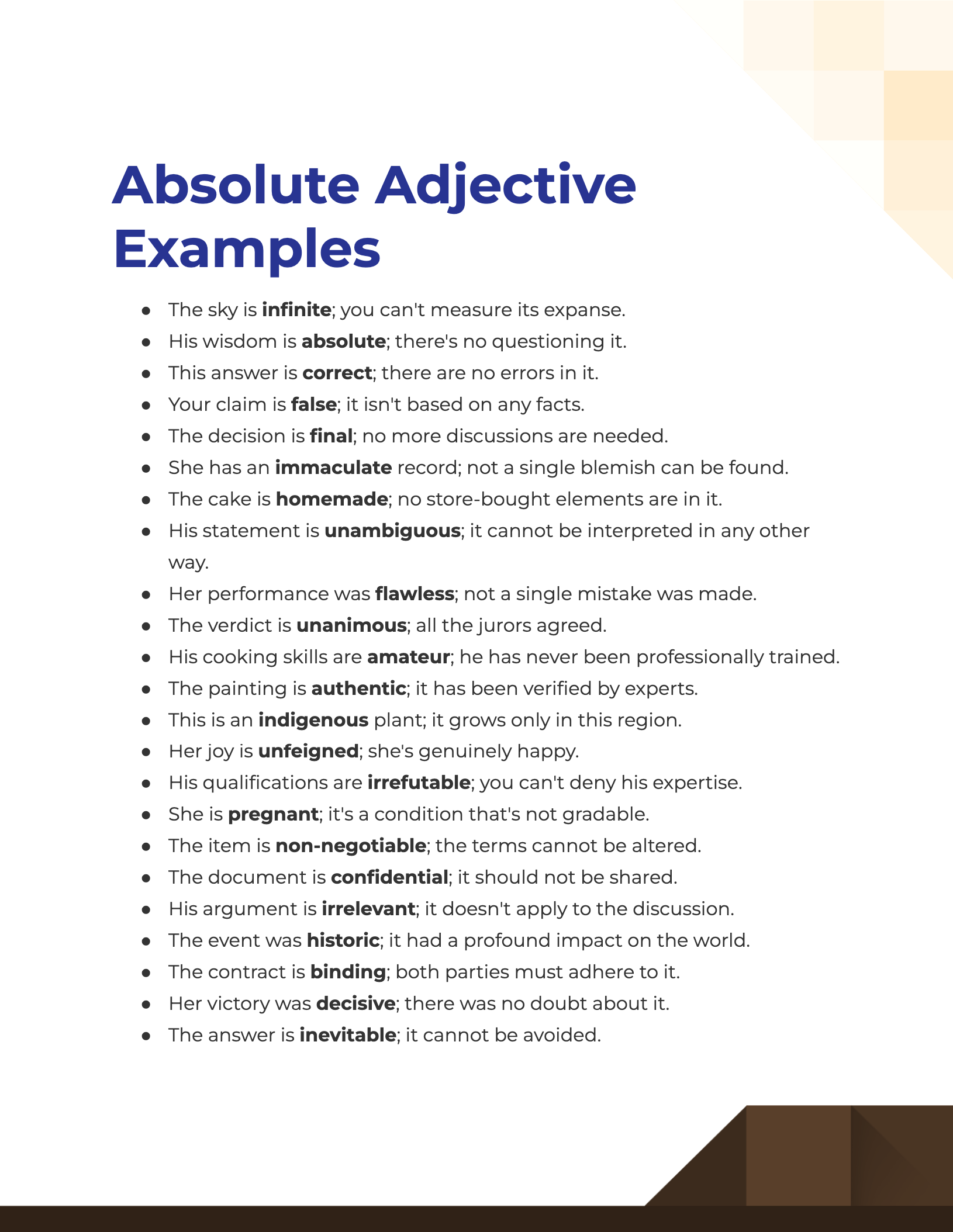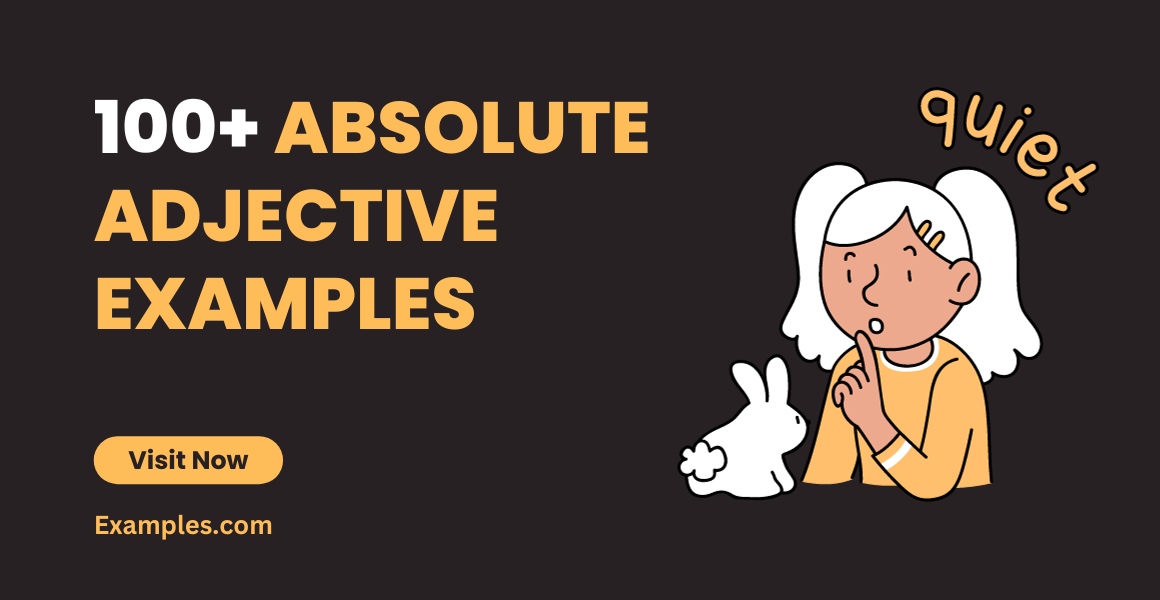99+ Absolute Adjective Examples
Get ready to elevate your writing and conversation skills with the power of absolute adjectives. These unique terms defy comparison and stand alone in meaning. Our complete guide provides exclusive tips and adjective examples to make your usage absolutely impeccable. Perfect for writers, students, and anyone aiming to articulate with precision.
What is the Absolute Adjective? – Definition
An absolute adjective is a word that serves as a descriptor but can’t be compared. It describes a quality that is either present or absent; there’s no in-between.
What is the Best Example of an Absolute Adjective?
One stellar example of an absolute adjective is “unique.” The word means “being the only one of its kind; unlike anything else.” It doesn’t make logical sense to say something is “more unique” or “most unique” because something is either unique or it isn’t.
100 Absolute Adjective Examples

Unveil the distinct universe of absolute adjectives with our curated list of 100 examples. These adjectives defy comparison, offering concrete attributes that stand on their own. Enhance your vocabulary and make your sentences more striking. Each example includes context to clarify the ideal usage, making this guide indispensable for students, educators, and aspiring wordsmiths.
- The sky is infinite; you can’t measure its expanse.
- His wisdom is absolute; there’s no questioning it.
- This answer is correct; there are no errors in it.
- Your claim is false; it isn’t based on any facts.
- The decision is final; no more discussions are needed.
- She has an immaculate record; not a single blemish can be found.
- The cake is homemade; no store-bought elements are in it.
- His statement is unambiguous; it cannot be interpreted in any other way.
- Her performance was flawless; not a single mistake was made.
- The verdict is unanimous; all the jurors agreed.
- His cooking skills are amateur; he has never been professionally trained.
- The painting is authentic; it has been verified by experts.
- This is an indigenous plant; it grows only in this region.
- Her joy is unfeigned; she’s genuinely happy.
- His qualifications are irrefutable; you can’t deny his expertise.
- She is pregnant; it’s a condition that’s not gradable.
- The item is non-negotiable; the terms cannot be altered.
- The document is confidential; it should not be shared.
- His argument is irrelevant; it doesn’t apply to the discussion.
- The event was historic; it had a profound impact on the world.
- The contract is binding; both parties must adhere to it.
- Her victory was decisive; there was no doubt about it.
- The answer is inevitable; it cannot be avoided.
- His loyalty is unquestionable; he has always been faithful.
- The statement is literal; there’s no figurative meaning.
- The outcome is certain; there are no other possibilities.
- His silence was deafening; it spoke volumes.
- Her beauty is ethereal; it’s as if she’s not of this world.
- The fabric is synthetic; it’s not made from natural fibers.
- The room was spotless; there was not a speck of dirt.
- Her theory is unproven; it hasn’t been verified yet.
- The dish is vegetarian; it contains no animal products.
- The verdict is guilty; he broke the law.
- His actions are illegal; they go against the law.
- Her alibi is concrete; she has evidence to back it up.
- The event is annual; it happens once a year.
- His conduct was impeccable; he followed all the rules.
- The sky was cloudless; not a single cloud in sight.
- The setting was idyllic; it looked like a painting.
- The diamond is genuine; it’s not a fake.
- The baby is innocent; he knows nothing of the world.
- The soup is homogeneous; it’s evenly mixed.
- The forest is dense; it’s filled with trees.
- The liquid is transparent; you can see through it.
- The book is complete; no pages are missing.
- His claim is invalid; it’s not based on facts.
- The question is rhetorical; it doesn’t require an answer.
- The area is residential; only houses are here.
- Her interest is academic; she studies it but doesn’t practice it.
- His style is minimalist; he keeps things simple.
- The puzzle is intricate; it has many complex pieces.
- The painting is abstract; it doesn’t represent anything specific.
- Her health is optimal; she’s in the best possible condition.
- The idea is original; no one else has thought of it.
- The solution is universal; it applies to all cases.
- The deal is exclusive; it’s not offered to anyone else.
- Her singing is operatic; it’s suitable for opera.
- The matter is urgent; it requires immediate attention.
- The instruction is explicit; it leaves no room for interpretation.
- His action was spontaneous; he didn’t plan it.
- The reaction was immediate; it happened right away.
- The sound was inaudible; it couldn’t be heard.
- His reflexes are quick; he responds immediately.
- The food is organic; it’s grown without synthetic chemicals.
- The air is pure; there are no pollutants.
- The style is vintage; it’s from an earlier time.
- The wine is fermented; it’s gone through a chemical process.
- The sculpture is massive; it’s very large.
- The party was wild; it was out of control.
- The theory is evolutionary; it’s based on the concept of evolution.
- The contract is binding; both parties must adhere to it.
- Her victory was decisive; there was no doubt about it.
- The answer is inevitable; it cannot be avoided.
- His loyalty is unquestionable; he has always been faithful.
- The statement is literal; there’s no figurative meaning.
- The outcome is certain; there are no other possibilities.
- His silence was deafening; it spoke volumes.
- Her beauty is ethereal; it’s as if she’s not of this world.
- The fabric is synthetic; it’s not made from natural fibers.
- The room was spotless; there was not a speck of dirt.
- Her theory is unproven; it hasn’t been verified yet.
- The dish is vegetarian; it contains no animal products.
- The verdict is guilty; he broke the law.
- His actions are illegal; they go against the law.
- Her alibi is concrete; she has evidence to back it up.
- The event is annual; it happens once a year.
- His conduct was impeccable; he followed all the rules.
- The sky was cloudless; not a single cloud in sight.
- The setting was idyllic; it looked like a painting.
- The diamond is genuine; it’s not a fake.
- The baby is innocent; he knows nothing of the world.
- The soup is homogeneous; it’s evenly mixed.
- The forest is dense; it’s filled with trees.
- The liquid is transparent; you can see through it.
- The book is complete; no pages are missing.
- His claim is invalid; it’s not based on facts.
- The question is rhetorical; it doesn’t require an answer.
- The area is residential; only houses are here.
- Her interest is academic; she studies it but doesn’t practice it.
- His style is minimalist; he keeps things simple.
Absolute Adjective Examples with Answers
- The baby is awake; you can’t be “more awake” than that.
- Answer: The absolute adjective here is “awake.”
- The dog is dead; no creature can be “more dead.”
- Answer: The absolute adjective here is “dead.”
- The glass is empty; it can’t get “more empty.”
- Answer: The absolute adjective here is “empty.”
- The story is true; it can’t be “more true.”
- Answer: The absolute adjective here is “true.”
- His answer was correct; an answer can’t be “more correct.”
- Answer: The absolute adjective here is “correct.”
- The night was silent; you can’t be “more silent” than complete silence.
- Answer: The absolute adjective here is “silent.”
- The door is closed; it can’t be “more closed.”
- Answer: The absolute adjective here is “closed.”
- She is pregnant; one can’t be “more pregnant.”
- Answer: The absolute adjective here is “pregnant.”
- The work is complete; you can’t have something “more complete.”
- Answer: The absolute adjective here is “complete.”
- He was unique in his approach; you can’t be “more unique.”
- Answer: The absolute adjective here is “unique.”
Funny Absolute Adjective Examples
- Your joke was so bad, it’s dead to me.
- Wow, that hairstyle is so last century; it’s extinct!
- Your dance moves are unique, and that’s saying something.
- His awkwardness level is absolute; it can’t get higher.
- That disguise is so bad, it’s transparent.
- Your cooking is infallible; even the dog won’t eat it.
- That movie was so boring; it’s immortal because it felt like it would never end.
- Your fashion sense is so unique, even a clown would be jealous.
- That “hidden” talent of yours is obvious to everyone.
- Your attempt at being mysterious is blatantly obvious.
Is “Absolute” an Adjective or Adverb?
The word “absolute” can primarily serve as an adjective. For instance, “This is an absolute disaster!” In some contexts, it may also serve as a noun, but it is not typically used as an adverb.
Is “Hungry” an Absolute Adjective?
No, “hungry” is not an absolute adjective. Absolute adjectives are those that cannot be intensified because they already describe a condition in its ultimate form. Since you can be “very hungry” or “slightly hungry,” the term “hungry” can be modified, making it not absolute.
Is “Perfect” an Absolute Adjective?
Yes, “perfect” is an absolute adjective. Something that is perfect cannot be “more perfect” or “most perfect” because perfection is an ultimate condition that cannot be exceeded.
Is “Talented” an Adjective?
Yes, “talented” is an adjective. It is used to describe someone who has a natural aptitude or skill for something. For example, “She is a talented musician.”
How to Use an Absolute Adjective? – Step by Step Guide
Using absolute adjectives correctly can elevate your writing and make your sentences more precise. Here’s a step-by-step guide:
- Identify the Absolute Adjective: Know what absolute adjectives are. Examples include “perfect,” “unique,” “dead,” and “infinite.”
- Avoid Modifiers: Since absolute adjectives describe the ultimate degree of something, avoid using words like “very,” “more,” or “most” with them.
- Use Them Sparingly: Absolute adjectives are strong words that stand well on their own. Don’t overuse them, or they may lose their impact.
- Placement: Usually, absolute adjectives come before the noun they modify. For example, “She had a unique idea.”
- Sentence Position: You can also use them as predicate adjectives after a linking verb. For example, “The circle is complete.”
- Double Check: Always read your sentence after inserting an absolute adjective to ensure it makes sense and conveys the meaning you intend.
- Context Matters: While the adjective itself is absolute, the interpretation may depend on context. Make sure the context supports the use of an absolute term.
Tips for Using Absolute Adjective
- Be Cautious with Comparisons: Since absolute adjectives denote extremities, they generally should not be used for comparisons. Saying “more unique” is often considered incorrect.
- Simplicity is Key: One of the strengths of absolute adjectives is their ability to convey a strong, unambiguous message. Keep your sentence structure simple to complement this strength.
- Know the Exception: Words like “absolute” can be adjectives themselves but can also act as intensifiers, as in “absolute silence.” Recognize when an absolute term is not acting as an adjective.
- Clarify if Needed: While you shouldn’t use modifiers with absolute adjectives, you can use clarifying phrases. For example, instead of saying “very dead,” you could say “dead as a doornail.”
By following these steps and tips, you can utilize absolute adjectives effectively to add weight and clarity to your sentences.



